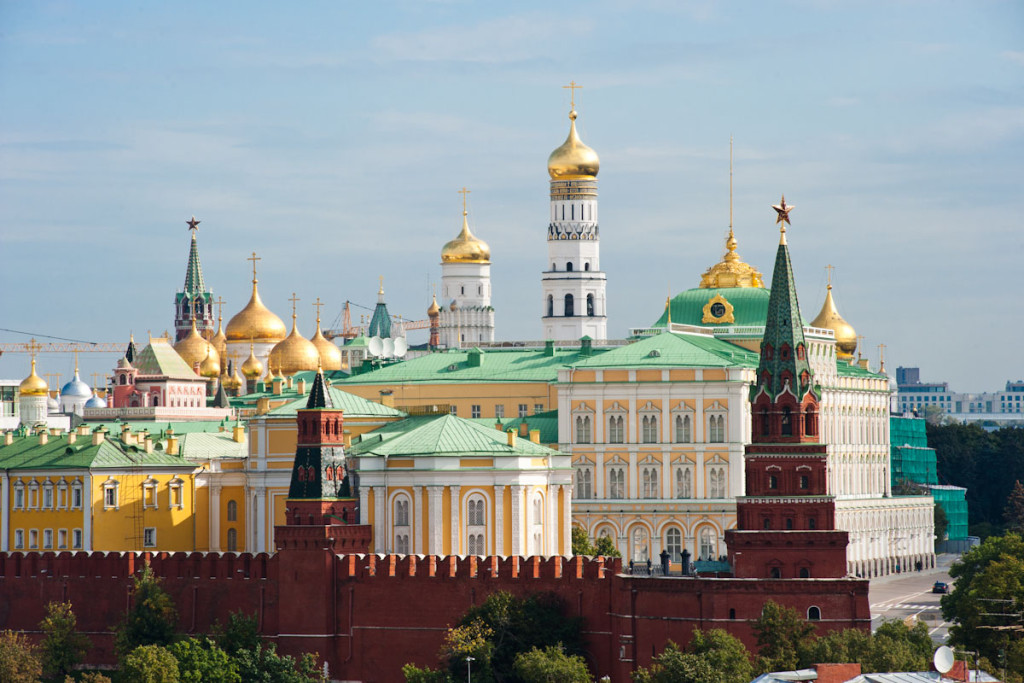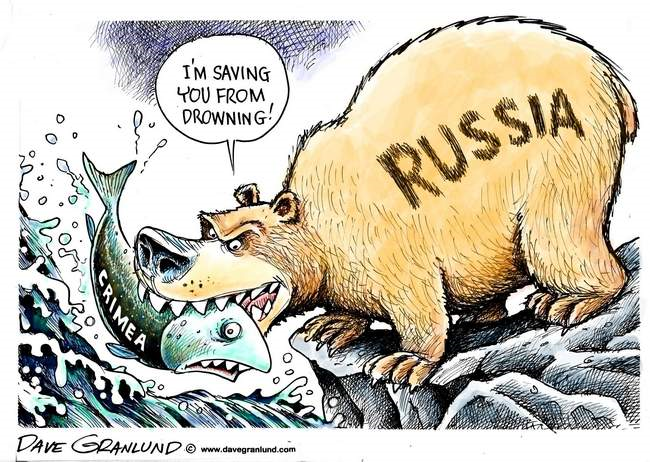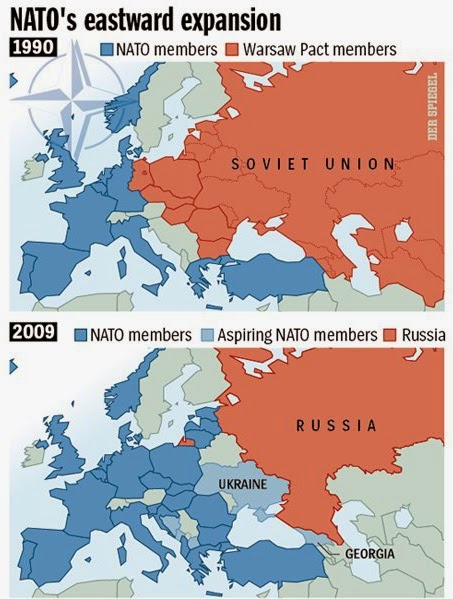The Return of Russo-Phobia in the West and Its Implications on Russia-EU Relations
2,524 views / 3 Nov 2015
By Aziz Elmuradov
It is remarkable that in recent years Russo-phobia has increasingly gained a new momentum in the West. In contrast with Islamophobia and similar to occasionally visible Sinophobia, the term Russo-phobia finds a rare explicit discussion among scholars and policy makers.
However, in the wake of the most recent security crisis in Europe, anti-Russia-sentiments seem to have grown in significant popularity making the “fear of Russia” a defining factor in the discourse of international relations. Especially Russia’s involvement in the Ukrainian crisis and its annexation of Crimea marked a new departure point in making an aggressive and hostile image of Russia.
The Oxford Dictionary defines phobia as “a strong unreasonable fear of something.” Psychology defines phobia as “a type of anxiety disorder, a persistent fear of an object or situation, typically disproportional to the actual danger posed.”[1] Psychology chooses to treat phobia with various methods such as the cognitive behavioral therapy which allows a patient to challenge dysfunctional thoughts or beliefs by being mindful and rational about their environment. Is Russo-phobia an unreasonable fear? How is fear of Russia perceived in the West?
Fear of the big Russian bear in the West is largely shaped by widespread rhetoric in politics and mainstream media. Probably one of the most favorite rhetoric is around President Putin’s speech at the Annual Address to the Russian Federal Assembly in 2005 when he said: ‘The breakup of the Soviet Union was the greatest geopolitical tragedy of the 20th century.’[2] This omnipresent quote is one of the examples how the Russia-loathing public paranoia is fed in the West. Many people are led to believe that if the the breakup of the USSR was the greatest geopolitical tragedy , then the greatest geopolitical achievement should be its reformulation. In their book “Mr. Putin: Operative in the Kremlin”[3] authors Hill and Gaddy address this issue. “Most references to this line have suggested that Putin was bemoaning the loss of the communist economic and political system. But Putin has since frequently underscored that he was talking about the collapse of the Russian state itself.”[4] Gaddy argues that “Putin is not eager to re-establish the USSR, partly because it would be costly for Russia, which subsidized many Soviet countries during that era. He does, however, want to make sure surrounding countries are not used against Russia.”
Surprisingly, however, there is very little media coverage in the West of Putin’s another statement disfavoring ideas relating to the reestablishment of the Soviet Union. Notably, he said: “Anyone who doesn’t regret the passing of the Soviet Union has no heart. Anyone who wants it restored has no brains.”[5]
The concept of Orientalism by Edward Said could offer an interesting alternative insight into the past of Russo-phobia. “This narrative started after World War II, when Western intellectuals and political leaders built the image of communism as something alien and incomprehensible to the minds of Westerners. To some extent, that was done to combat homegrown communists. The strategy proved successful, as communist parties never really succeeded in the West, especially in the Anglo-Saxon part of it.”[6] However, attitudes hardly changed at the end of the day when the Soviet Union collapsed. The West never truly trusted their Russian counterparts. Today Russophobia-induced stereotypes seem to be returning to the international political scene. According to Andrei Tsygankov, associate professor of international relations at San Francisco State University, American Russo-phobia gaining new grounds and it creates negative popular perceptions of Russia not only on the American soil but also globally. It is, however, fundamentally incompatible with the interests of the US.
While some analysts and policy makers in the West believe that the Russian occupation of Crimea points at Russia’s nostalgia for its imperialist past[7], some hold that Russian reactions are quite natural and legitimate.[8] For example, the outstanding scholar of international relations John Mearsheimer points out that “the United States and its European allies share most of the responsibility for the crisis in Ukraine. The taproot of the trouble is NATO enlargement, the central element of a larger strategy to move Ukraine out of Russia’s orbit and integrate it into the West.”
According to Samuel Charap, Senior Fellow for Russia and Eurasia at the International Institute for Security Studies in London, Russian motives are far more defensive and reactive.[9] He believes that western politico-economic integration initiatives in post-Soviet space create an acute dilemma for Russia between competition and integration. Since Russia can not join integration processes in the West, it has consistently expressed its concern over the West’s institutional enlargement toward its borders. Russia has clearly positioned itself against NATO enlargement to its borders. The Alliance, on the other hand, has argued that it has solely a defensive and peaceful purpose. “Membership for the post-communist countries would alleviate their threat perceptions and facilitate their democratic transition and security-sector reform, thereby providing Russia with constructive, stable neighbors.”[10] However, such statements have barely been helpful in convincing Russian politicians. Especially after NATO’s announcement of its readiness to accept Georgia and Ukraine as members in 2008, Russia grew deeply skeptic and sought to strengthen collective security arrangements in the post-Soviet Eurasia under its own leadership through bilateral agreements and in the framework of the Collective Security Treaty Organization.
Another example is the Eastern Partnership initiative of the EU with the post-Soviet countries of Armenia, Azerbaijan, Belarus, Georgia, Moldova and Ukraine. This initiative aspires over the course of a period to reach Deep and Comprehensive Free Trade Agreement in the framework of respective countries’ Association Agreements with EU. Without a doubt, once these institutional links are built, they should eventually integrate Armenia, Azerbaijan, Belarus, Georgia, Moldova and Ukraine into the EU’s economic–legal space thereby exacerbating integration dilemma for Russia further on.
Today Russia seeks to counterbalance its integration dilemma through the promotion of the Eurasian Economic Union with Kazakhstan, Belarus, Armenia and Kyrgyzstan. However, many in the West continue to believe that Moscow seeks to reintegrate its neighbors into its sphere of influence and thus re-establish the Soviet Union.[11]
Of course, neither is Russia devoid of strong anti-western sentiments. It has historically harbored mistrust against the West which has decisively shaped the nature of its relations with that vast neighborhood symmetrically resulting in diverse spectrum of reciprocal dislikes, fears and prejudices. But today there is an increasing need for critical understanding between the West and Russia. Critical understanding matters as much as ever before and it does so in many ways. Today we see increased potential for militarization in both sides. On one hand, we have NATO allies in Eastern Europe who have voiced their security concerns and called for the implementation of security measures to defend themselves. Ukraine has abandoned its non-bloc-policy and expressed an interest in joining the transatlantic security alliance. On the other hand, Russia is busy show-casing its military power and persistent determination to endure Western sanctions. It conducted the largest ever Victory Day military parade alongside with China which displayed its support and formidable military power.
While states and their media are busy dealing with creating the fear of Russia, it is important that policy makers in the West take a deeper look at their alternative options. Engagement, reciprocity, and patience should be key factors to improving relations with the enormous, resource-rich, and strategically important country. The West may well need Russia’s help in many regards. Containing a rising China to some extent and fighting the increasing threats of radical Islam in the Middle East and beyond, helping ease the tense situation involving the Syrian refugees should be important and may only be successful with Moscow’s help.
Disclaimer: the views and opinions contained in this article are those of the author. They do not necessarily represent the views of Russian Accent.
Notes:
[1] Bourne, Edmund. The Anxiety & Phobia Workbook 5th ed. New Harbinger Publications. pp. 50–51. 2011.
[2] Putin, Vladimir. Annual Address to the Federal Assembly of the Russian Federation. Kremlin, Moscow. 2005.
[3] Fiona Hill & Clifford Gaddy. Mr. Putin: Operative in the Kremlin. Brookings Institution, New York. 2013.
[4] Valdimir Putin. “Tens of millions of our co-citizens and co-patriots found themselves outside Russian territory. Moreover, the epidemic of disintegration infected Russia itself.” Annual Address to the Federal Assembly of the Russian Federation. Kremlin. April, 2005.
[5] Tom Parfitt, (2007). Spy who came in from the cold. The Guardian.
http://www.theguardian.com/world/2007/dec/23/russia.tomparfitt
[6] Afanasiy Pervomaiskiy, (2015). The West Should Take “Orientalist” Glasses Off to See the Clear Picture of Russia. https://r-accent.com/2015/05/17/orientalism_russia/
[7] Wadim Nikitin, (2014). Putin is exploiting the legacy of the Soviet Union to further Russian ends in Ukraine. http://www.independent.co.uk/voices/comment/putin-is-exploiting-the-legacy-of-the-soviet-union-to-further-russias-ends-in-ukraine-9170539.html
[8] John Mearsheimer, (2014). Why the Ukraine Crisis Is the West’s Fault. Foreign Affairs.
[9] Charap & Troitskiy. Russia, the West and Integration Dilemma. International Institute for Strategic Studies. London. 2014. p. 49.
[10] Charap & Troitskiy. Russia, the West and Integration Dilemma. International Institute for Strategic Studies. London. 2014. p. 52.
[11] Ibid. p. 52.
About the Author:
Aziz Elmuradov
University of Stuttgart, Institute for Social Sciences
Department of International Relations and European Integration
Email: aziz.elmuradov@sowi.uni-stuttgart.de
POST A COMMENT
Your email address will not be published. Required fields are marked *



comments (0)
Write a comment share your opinions with others.